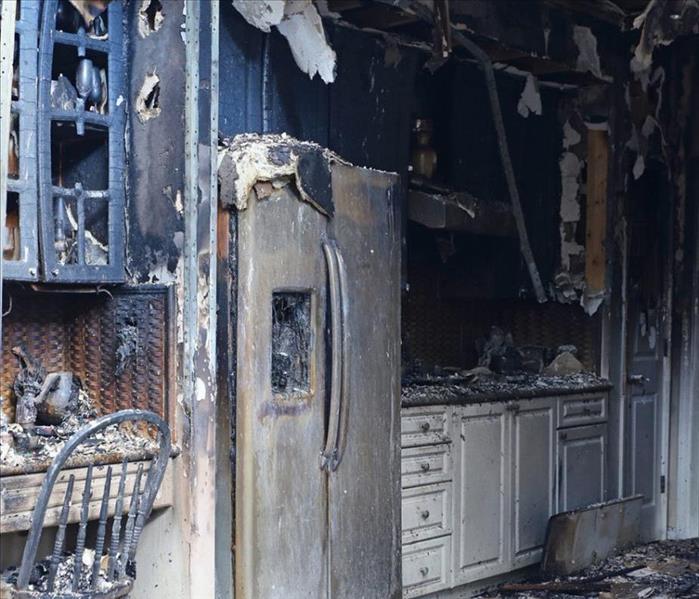COMMON CAUSES OF KITCHEN FIRES
7/1/2022 (Permalink)
Probably one of the scariest experiences anyone could face is dealing with a home cooking fire. Most people cook every day, but it could only take a second for something to catch on fire. A 2020 research report from the National Fire Protection Association averages that nearly 49 percent of all reported home fires are caused by cooking.
True Builders has provided kitchen fire repair services to dozens of homes in the Bronx, so we understand first-hand how devastating a house fire can be and the type of structural damage it can create.
Seeing as the holiday season is the peak time of year for most home cooking fires, it's important to be aware of the five most common reasons causes of a kitchen fire. Knowing these safety risks isn't just a way to help avoid costly home repairs; it could save your life.
1) Leaving your cooking unattended
Unattended cooking is by FAR the leading factor of most kitchen fires. In fact, it was the cause of nearly 31 percent of all home fires and 53 percent of cooking fire-related deaths between 2014-2018.
Walking away while you're cooking, even for a second, can quickly become a dangerous situation. It's never a good idea to multi-task and be moving around your house if there is an open flame or your stove is set to a high temperature. You should always be focused on your cooking.
Also, if you feel you're too tired or not feeling well, it's better to leave the stove alone and order takeout. Nearly 23 percent of kitchen fires happened because the person was asleep, and sleeping accounted for almost 40 percent of civilian casualties from 2014-2018.
2) Frying with oil
Anytime you fry or broil anything using oil, it needs continuous attention. Two-thirds (66 percent) of kitchen fires occurred after cooking oil, fat, grease, butter, and other cooking substances were ignited. Oil can make the fire spread faster and can still cause a fire the next time someone cooks if there's any residue left on the stovetops.
When you're cooking and frying oil:
- Cover the bottom of your pan with just enough oil so your food isn't submerged.
- Add your food gently into the pan so the oil doesn't splatter.
- Clean the entire cooking area and countertops so no oil or grease splatter is left on any surface.
- In the event your pan does catch on fire, DO NOT use water to extinguish the flames. This will only cause the fire to spread. If you can, put on oven mitts and safely slide a non-glass lid onto the pan to smother the flames and then turn off your stove.
3) Setting the cooking temperature too high
You don't need to turn your stove or oven top all the way up to properly cook your food. While you may be hungry and just want to get the cooking out of the way, setting your appliances to ridiculously high temperatures is extremely dangerous.
As mentioned before, food combustion is responsible for most kitchen fires, and when combined with oil, it creates a recipe for disaster. Preheat your stove or oven to the recommended cooking temperature and don't leave it unattended. If you have a gas stove, never let the flame rise over the top of the pot or pan. Be patient and follow exactly what the recipe calls for.
4) Wearing loose-fitting clothing around your stove
Clothing ignitions are responsible for a large number of fire-related deaths even though they make up less than one percent of all home cooking fires annually. Loose and billowy clothes can catch on fire if they come in contact with a burner or if the fabric gets caught on the stove.
How quickly your clothes will catch on fire depends on the type of fabric. Cotton and linen burns quickly and can be lit in a matter of seconds. Polyester, nylon, and spandex won't burn as fast, but what makes synthetic materials so dangerous is that they'll melt directly onto your skin. The best thing to wear when cooking is a fire-retardant apron and form-fitting clothes.
5) Flammable compounds left near an open flame or other heating elements
Your kitchen is full of flammable objects. Napkins, paper towels, rags, food packages, cookbooks, recipe cards, and wooden utensils should never be left near or around your stove or oven top. It's important any highly flammable or combustible items are kept away from your cooking surfaces.
What should you do after you experience a kitchen fire?
Above all else, call 911 immediately if you cannot control the kitchen fire. A kitchen or home is replaceable, your life isn't.
If the cooking fire was small and has been properly handled, you should give our team at True Builders a call! There are a number of items that will need replacing after a kitchen fire, including your cabinets, flooring, appliances, and countertops. Smoke can also damage your walls and the material underneath, so these things may need replacing as well. Once we've assessed the damage, we can go to work on the repair and restoration process.
If you've experienced a kitchen fire due to one of the five items listed above, call True Builders to come and fix the damage!
Only you can help prevent kitchen fires. It's key to reducing the possibility of starting a fire while cooking. Always keep these five elements in mind the next time you go use your stove or oven. In the event of a kitchen fire, AFTER calling 911 if necessary, remember to call us at 347-590-9902! We'll fix all the existing damage and help things get back to normal!






 24/7 Emergency Service
24/7 Emergency Service
